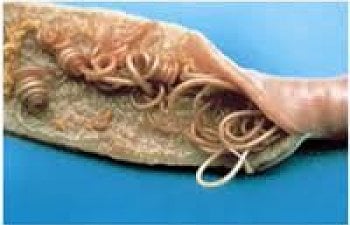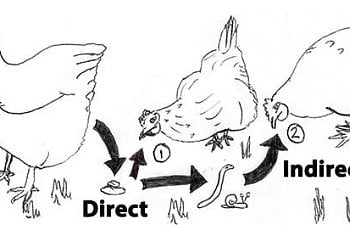Internal Parasites - Worms
Worms, what are they, where do they come from and what to do about them.

Worms, what are they, where do they come from and what to do about them.
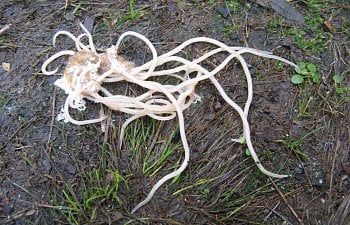
Worms are everywhere... they are in the soil, insects can carry their eggs and they can sometimes be found inside your chickens as well. Knowing a little bit about their life-cycles and how your birds can get them will help you help to control and manage their numbers and help you keep your chickens happy and healthy all through their lives.
Like bacteria and Coccidiosis for example, small amounts of worms can actually be beneficial to poultry as their bodies can develop immunity and they learn to control their worm's population. However in cases of extreme conditions and birds are exposed to excess amounts of worms and their eggs, many birds become overwhelmed and become sick.
Worms can cause very serious illness and if left untreated can kill your birds. Round worms can impact the intestines, slow down the crop, eat all the food the bird consumes and starve the bird to death. If starvation doesn't kill the bird, the worm population can actually rupture the intestinal wall and the bird dies. I do recommend you take a poop sample to your vet if you suspect your flock has worms. You will then know what you are dealing with.
Symptoms of worms in chickens:
Symptoms of a worm infestation in chickens can include: worms in eggs, (worms travel backwards in the intestines toward the vent, turning into the oviduct and proceed to the unterus where they become incapsulated in an egg) abnormal droppings, (diarrhea, foamy-looking, etc) weight loss, pale comb/wattles, listlessness, dirty vent feathers, worms in the droppings or throat, gasping, head-stretching and shaking, reduced egg production and sudden death.
There are two types of worms that infect chickens: Roundworms and Flatworms.
Roundworms are the most common parasitic worms that affect your chickens and some of these worms can do significant damage if not controlled.
Large Roundworms (Ascarids): These are long worms that invade the intestines of the chicken. They can grow up to several inches long. If not caught and treated in time, they can completely strangulate the intestinal tract, killing the bird. These worms consume the food the bird eats and slowly starve the bird to death.
Cecal Worms: Small worms that are found in the ceca. Although they are quite common, they rarely cause serious problems.
Impacted intestines full of Roundworms...
Capillary Worms: These are tiny hair like worms that affect the crop and upper intestines. A severe infestation of capplilaria worms can cause your hens to lay eggs with completely colourless yolks! Cappilary worms can sometimes cause blood in the stool when burrowing into the walls of the intestines.
Gape Worms: These worms are red forked type worms that settle in the bird's windpipe, causing them to gasp for air, cough and shake their heads in an effort to dislodge the worms. You can swab the mouth and throat with a Q-tip and bring up Gape Worms if the bird shows signs like gaping and gasping for air. (Not to be confused with a respiratory ailment)
Gapeworms in the windpipe....
Flat Worms are less common, but is also a risk for poultry keepers. They are: notable
Tapeworms: Long, white flat like worms that settle in the intestines. They are segmented and these segments can sometimes be seen in the poop as what looks like grains of rice. If you see segments moving around in the feces, you have tapeworms in your flock.
Tapeworm segments in chicken feces...
Flukes: These worms attach themselves to places inside the bird's body or even under the skin. They are transmitted by chickens eating snails and dragonflies and wild birds also carry them. These worms often appear as cysts near the vent of the birds.
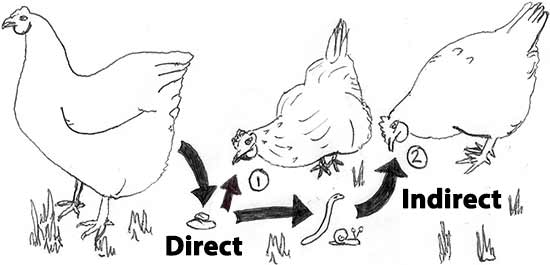
Lifecycle, prevention, and treatment:
The Direct Life-cycle: The chicken expels the worm eggs in it's droppings and another chicken then eats these eggs and becomes infested as well.
The Indirect Life-cycle: The chicken expels the worm eggs and some insect such as an ant, grasshopper, earthworm, flies, etc...eats these eggs. The chicken, in turn, eats these bugs and thus becomes infested.
Knowing these life-cycles can help you to keep your chickens from ingesting too many of these worms. Proper hygiene and coop/run maintenance will help to keep worm populations under control. Keep the coop and run as clean and dry as possible. Worms thrive in moist, warm environments. Chickens confined to runs are prone to the Direct Life-cycle worms. Free ranging chickens are prone to the Indirect Life-cycle worms and by keeping an eye on your flock, you can sometimes spot signs of worm infestations. Proper management and good sanitation can allow chickens to develop resistance to worms through gradual exposure. Of course stress, disease, or old age can cause the bird to lose the ability to control internal worms.
Preventing infestations:
Some poultry keepers de-worm their flocks on a regular basis, once a year to several times a year as a precaution. However this can be not only a waste of money, but can interfere with the chicken's ability to develop and maintain it's immunity to these parasites and worms can develop resistance to these drugs as well. So taking a fecal sample to a vet is easy and will tell you just what you are dealing with. You can then determine what type of worming drug to use based on what type of worms your birds have. There are several types of natural wormers that claim to worm your birds, however chemicals are always recommend for any heavy infestation.
Keeping an eye on your flock and worming when you see signs of worms is the best way to keep your birds healthy. Any bird that has diarrhea, has lost a lot of weight, is weak and lethargic, has a pale comb, head drawn in, loss of interest in life, may be infested with worms.
Treating Worms:
There are many de-wormer products out there that are effective in treating worms in poultry, however these are the more common ones used here in the U.S.
Wazine (Peperazine) is used to treat Roundworm infestations only. It is a liquid added to the drinking water and is the only source of water for 24 to 48 hours. 1 ounce of Wazine per gallon of water. Repeat in 10 to 12 days. There is a 14 day meat and egg withdrawal period for this product.
Ivermectin is effective in controlling cecal worms along with some external parasites as well. There is a 14 day meat and egg withdrawal period for this product. For Ivermectin paste: .2 ml per pound of body weight. Dosed orally under the tongue for 3 to 5 days.
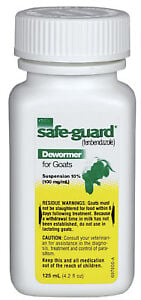
Fenbendazole is effective against most worms, Tape worms will require other medications. The brand name Safeguard contains Fenbendazole. Comes in liquid and paste. .2 mls per pound of body weight. Dosed orally under the tongue once a day for 3 to 5 days. (Capillary worms require a 5 day treatment.) Repeat these dosages in 10 days to kill unhatched eggs and more hatched worms. There is a 14 day meat and egg withdrawal period for this product.
Zimectrin Gold is effective against Tape Worms. Dose .3 ml per 5 pounds of bird. Repeat in 10 days.
Equimax is also effective to kill Tape Worms. Dose .16 ml per 5 pounds of bird. Repeat in 10 days.

Valbazen (Albendazole) is a broad spectrum wormer and takes care of nearly all worms, eggs and Tapeworms. .2 mls per pound of body weight dosed orally under the tongue once a day for 3 to 5 days. Repeat in 10 days. There is a 14 day meat and egg withdrawal period for this product.
Always follow all the instruction for dosages on labels and be mindful of meat and egg withdrawal periods.
For more on parasitic worms and how to prevent and treat them visit the Predators and Pests forum section.
Some further and recommended reading:
Valbazen -500ml
Worming with Valbazen
Does any one use ivermectin in chickens ?
Treating with Ivermectin
Dosage for Wazine 17
Worming with Wazine
WORMING with Fenbendazole - - How much?
de-worming chickens with goat safeguard(fenbendazole)
https://www.backyardchickens.com/threads/tape-worms.1272681/

